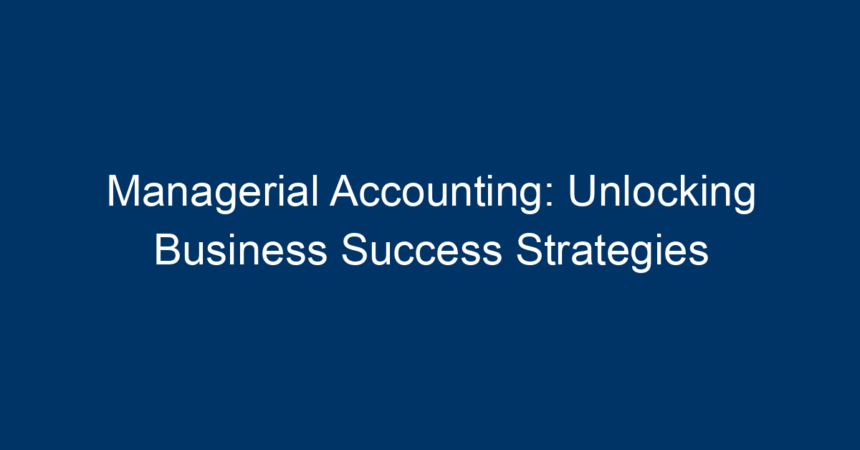In the fast-paced world of business, success isn’t merely a stroke of luck; it derives from effective decision-making and strategic planning. One of the key components driving this success is managerial accounting. This powerful tool offers valuable insights that empower businesses to thrive in competitive markets. If you’re interested in discovering how managerial accounting can elevate your business strategies, read on.
What Is Managerial Accounting?
Managerial accounting, often defined as management accounting, focuses on providing internal stakeholders, such as managers and executives, with the financial data needed to make informed decisions. Unlike financial accounting, which is aimed at external parties, managerial accounting serves as a vital resource for business leaders who seek to enhance their organization’s performance.
Key Functions of Managerial Accounting
-
Budgeting: Managerial accounting helps organizations prepare budgets that reflect their strategic objectives. It provides a framework for planning and controlling financial resources, ensuring operations align with overall goals.
-
Cost Analysis: By analyzing both fixed and variable costs, managers can identify areas for cost reduction and efficiency improvements. This aspect of managerial accounting helps firms maintain competitiveness.
-
Performance Evaluation: Managerial accounting introduces performance metrics that allow managers to assess individual and departmental contributions to the organization’s financial health.
- Decision Support: The decision-making abilities of managers are significantly enhanced through the insights provided by managerial accounting. From pricing strategies to product mix decisions, the data helps leaders choose the best paths forward.
The Importance of Managerial Accounting in Business
Better Decision-Making
Good decisions drive good results. Managerial accounting equips managers with timely and relevant data, including cost reports and financial forecasts, allowing them to make decisions that are not just reactive, but strategically proactive.
Enhanced Strategic Planning
Strategic planning is crucial for long-term success. With managerial accounting, businesses can evaluate various strategic options, using data-driven insights to inform their choices. This structured approach minimizes risks and maximizes returns on investment.
Increased Efficiency
Operational efficiency is a cornerstone of competitive advantage. Managerial accounting highlights areas where resources are underutilized or overextended, enabling businesses to operate more efficiently. By improving efficiency, organizations can enhance profitability without necessarily increasing revenue.
Risk Management
In today’s volatile market environments, risk management is essential. Managerial accounting offers tools for quantifying risks and measuring the potential outcomes of different decisions. By understanding financial implications, organizations can mitigate risks proactively.
Core Components of Managerial Accounting
1. Cost Classification
Understanding cost types is fundamental in managerial accounting. Costs can be classified into:
- Fixed Costs: Costs that remain constant regardless of production levels.
- Variable Costs: Costs that fluctuate with production volume.
- Direct Costs: Costs that can be directly attributed to a product or service.
- Indirect Costs: Costs that are not directly linked to a specific product.
2. Cost Behavior Analysis
Analyzing how costs respond to changes in business activity levels is critical. Through the study of cost behavior, organizations can forecast how costs will change with new projects or shifting market dynamics, supporting effective planning and budgeting.
3. Variance Analysis
Variance analysis involves comparing budgeted figures to actual performance. It helps organizations identify discrepancies and understand the underlying causes, whether they be favorable or unfavorable. This process drives accountability and enhances performance management.
4. Break-even Analysis
Break-even analysis determines the point at which total revenue equals total costs, indicating no profit or loss. This crucial metric helps businesses understand the minimum sales required to avoid losses, aiding in pricing and production decisions.
Implementing Managerial Accounting in Your Business
Step 1: Define the Objectives
Before integrating managerial accounting, clearly define its objectives within your organization. What do you hope to achieve? Improved budget management? Enhanced cost control? Identifying specific goals will streamline the implementation process.
Step 2: Choose the Right Tools
Choosing the appropriate software tools for managerial accounting is a vital step. Solutions like ERP systems and specialized accounting software streamline data collection, reporting, and analysis, making it easier for your team to focus on decision-making.
Step 3: Train Your Team
Equipping your team with the necessary skills is crucial. Invest in training programs to ensure your employees understand how to use managerial accounting data effectively. Knowledgeable staff can uncover insights that drive impactful strategies.
Step 4: Monitor and Adjust
After implementing managerial accounting, continuously monitor its effectiveness. Use feedback loops to refine processes and adapt to changes in the business environment. Stay flexible and responsive to ensure that managerial accounting continues to serve the organization’s needs.
Actionable Insights for Business Leaders
In conclusion, managerial accounting is not merely an option for businesses striving for success; it is a necessity. Here are some actionable insights to integrate this powerful resource into your organization:
-
Regularly Review Financial Reports: Frequent reviews of financial reports help you gain insights and make timely decisions.
-
Engage in Continuous Learning: Stay updated on managerial accounting practices and emerging trends. Knowledge is power, particularly in a competitive landscape.
-
Foster Cross-Department Collaboration: Encourage collaboration between finance and operational teams. A unified approach promotes transparency and enhances decision-making.
-
Embrace Technology: Utilize modern accounting software that provides real-time data analytics to gain a competitive edge.
- Set Clear KPIs: Establish clear Key Performance Indicators (KPIs) that align with your business goals. Regularly assess progress towards these KPIs to stay on track.
Conclusion
Managerial accounting is an indispensable tool for modern businesses seeking to navigate their financial landscapes successfully. Through insightful budgeting, cost analysis, and performance evaluation, companies can unlock their full potential. As you embrace managerial accounting, remember that it’s not just about the numbers; it’s about creating a roadmap for strategic success. Start leveraging managerial accounting today, and watch your business thrive!
Implementing these strategies will not only enhance your decision-making capabilities but will also pave the way for sustainable growth and success.




